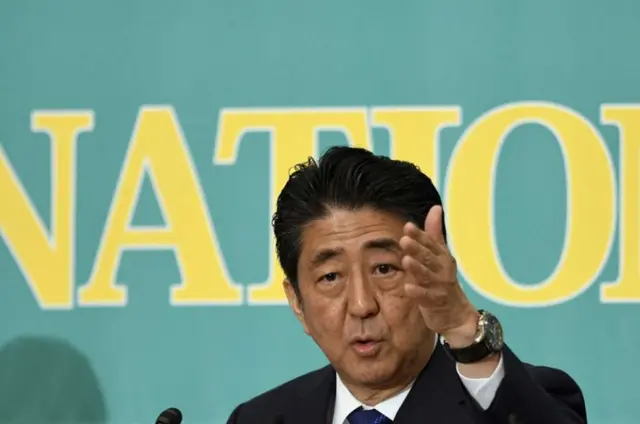On the face of it, Shinzo Abe and Natsuo Yamaguchi are the very best of political allies. The front pages of Japan’s newspapers were last week dominated by pictures of the two party leaders smiling and embracing at the scale of their shared victory in the previous day’s election for the Upper House of the Diet.
Beneath the bonhomie, however, the prime minister must be seething that he is reliant on a party, Komeito, with views that are in many areas diametrically opposed to his own for the two-thirds majority that he requires to revise Japan’s constitution.
This is especially so given Abe is determined to alter Article 9, which forbids Japan from waging war in order to settle international disputes – and is also the article dearest to Komeito members’ hearts.
Komeito won five extra seats in the July 10 vote, bringing its total to 25 in the 242-seat chamber, while Abe’s Liberal Democratic Party (LDP) won a further six seats, giving it a total of 121.
Allied with other small, conservative parties, Abe is now armed with the two-thirds majority that is required by law to call a referendum on altering the constitution. And while a senior member of Komeito says the party is happy to take part in discussions on revising a set of laws that many on the right here believe were imposed on Japan by the vengeful Allies at the end of the second world war, it does not support “the total replacement of the constitution”.
“The basic difference between our two parties is that the LDP has long maintained that it wants to establish a new, independently formed constitution,” Isamu Ueda, a Komeito politician and chairman of the party’s International Affairs Committee, told theSouth China Morning Post.
Despite victory in upper house elections, Abe does not have mandate to revise constitution
“Our position is that we respect the current constitution. However, we recognise that public opinion is in favour of reviewing the constitution. So while Komeito wants to retain it as it stands at present, we feel there is a need for discussions about changes.”
A draft put forward by the LDP for changes to the constitution, including to Article 9, does not have the pubic concensus, Ueda believes, but Komeito will support changes in areas that would benefit from being changed more than 70 years after it was enacted.
But, Ueda points out, Japan has already sent troops overseas, to take part in peacekeeping operations in the Middle East and South-East Asia, while the Self-Defence Forces also provided logistical support during the conflicts in Afghanistan and Iraq.
It is possible, he said, that future military deployments – with or without constitutional reform – “might not be so different from what we have now.”
The political situation in Japan has been very unstable, with prime ministers changing almost every year
Asked why a party that appears to have so many fundamental differences of opinion with its ally is working with the LDP, Ueda said one of Komeito’s objectives has always been to influence the government’s policies.
“We believe that over the past several decades, the political situation in Japan has been very unstable, with prime ministers changing almost every year,” he said. “That sort of ‘twisted government’ makes it very difficult to ensure stability and consistency in policies.”
And he dismisses the suggestion that Komeito might share a closer political vision with some of the nation’s opposition parties. The Democratic Party, for example, has “problems with its decision-making processes and governability”, he said, while its recent alliance with the Japanese Communist Party makes cooperation “difficult”, he added.
“Japanese politics makes for some very strange bedfellows,” said Jeff Kingston, director of Asian Studies at the Japan campus of Temple University. “Komeito feels that by working inside the coalition it can exert influence over the LDP and Abe and, when it comes to issues such as constitutional reform, make the prime minister jump through hoops to retain their support.
Shinzo Abe downplays poll win that could help remove bar on Japanese troops going to battle
“I feel they do take the LDP out of its comfort zone and force it to make compromises on issues such as social welfare.”
And because Abe needs Komeito to clear that two-thirds hurdle, Kingston believes Komeito will force the debate over the constitution into the public domain more than it has been to date. And that will force the public to decide whether it really wants its soldiers fighting in foreign wars.
 简体中文
简体中文

